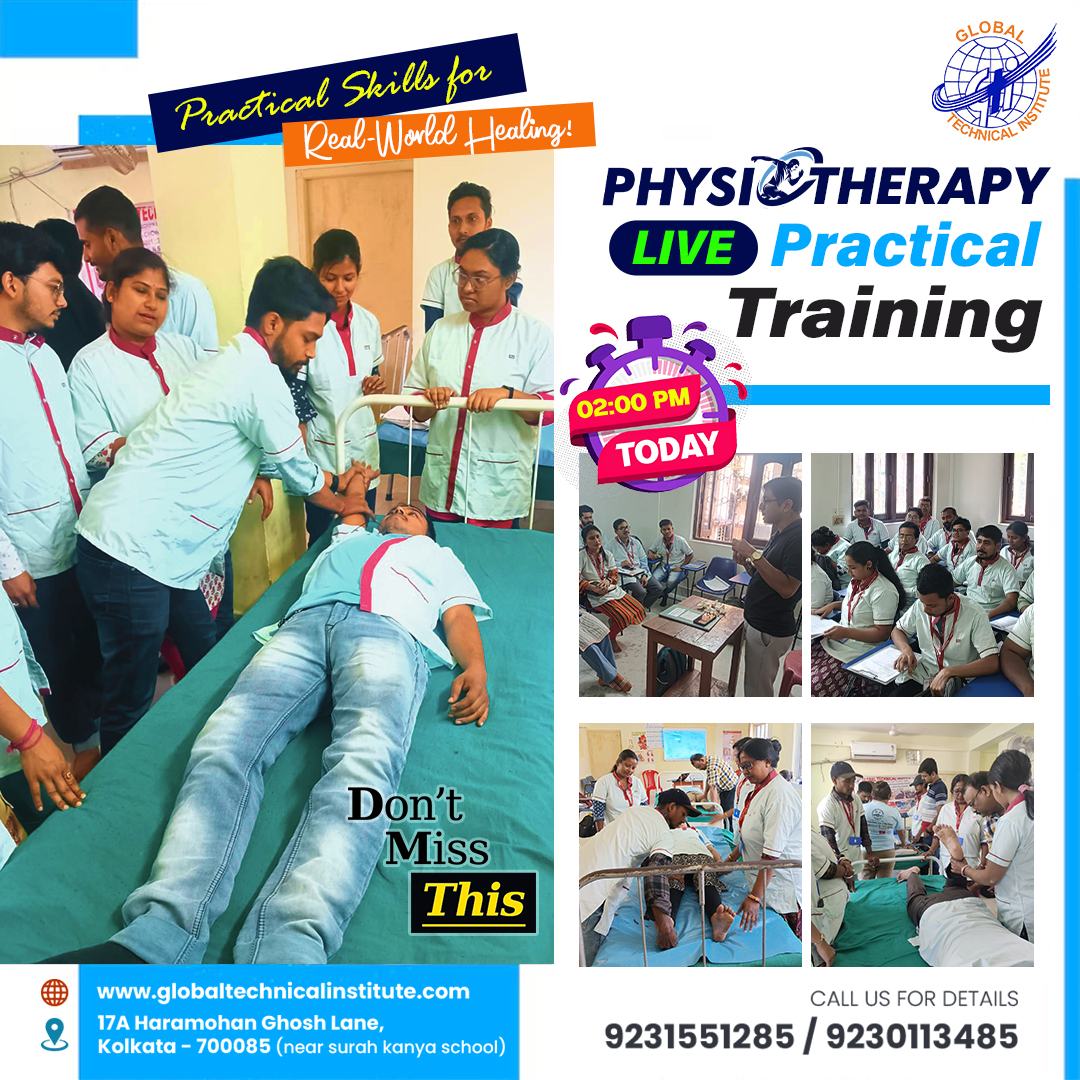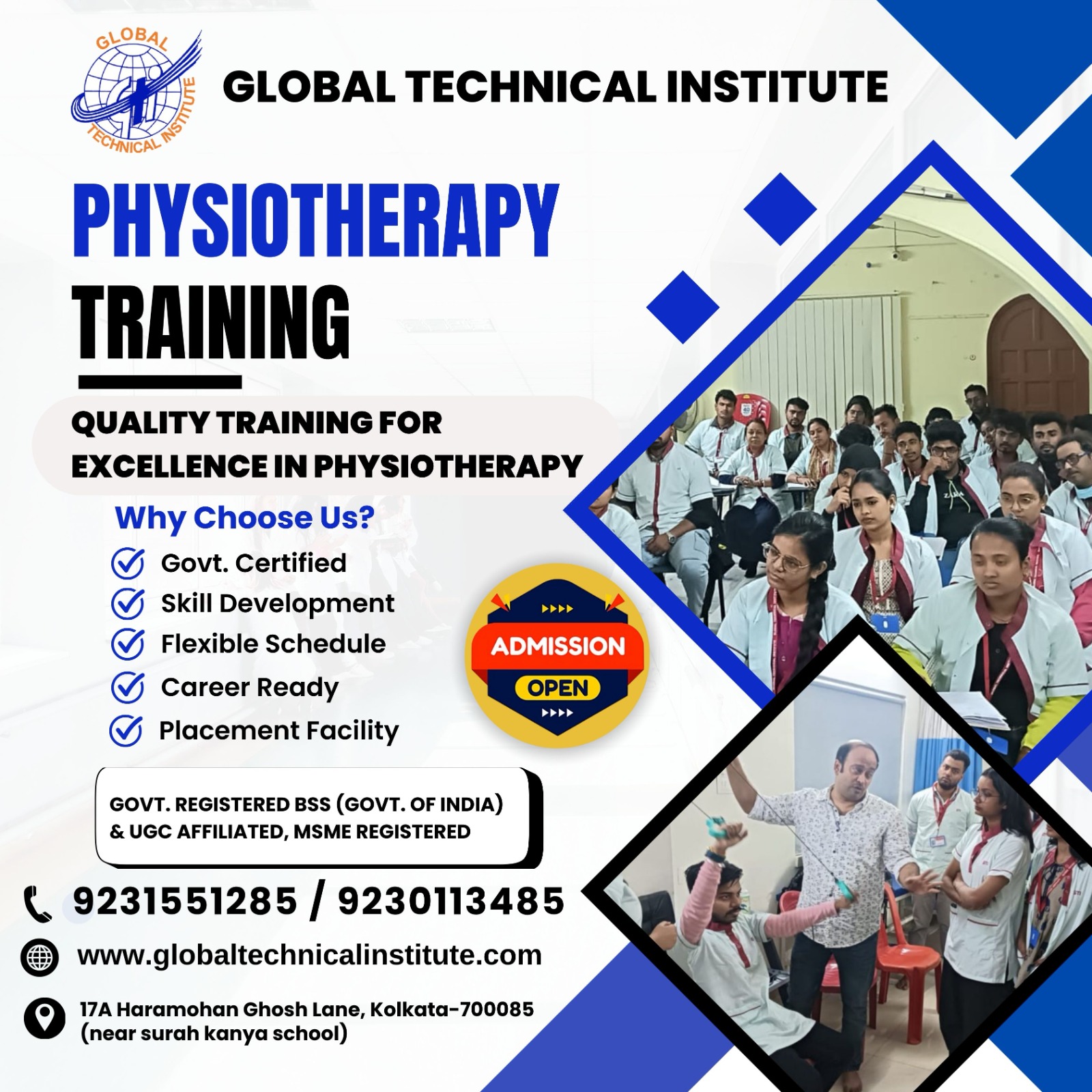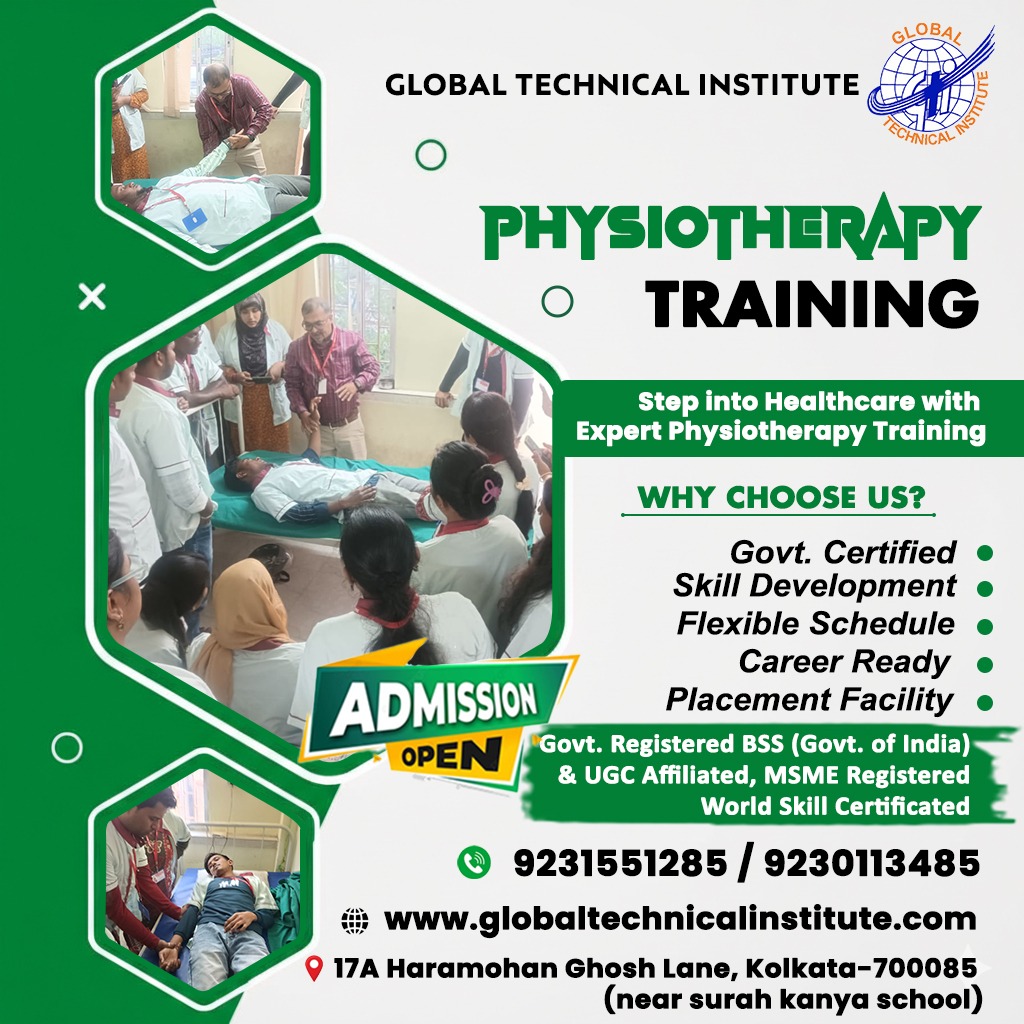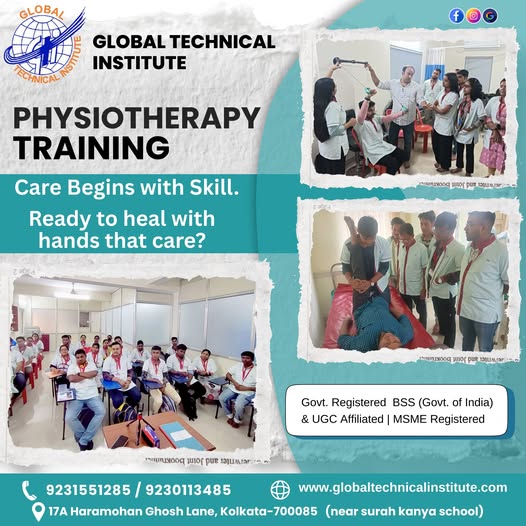Blog, Physiotherapy Training in Kolkata

Have you ever wondered what truly separates a mediocre physiotherapist from an exceptional one? The answer isn’t just theoretical knowledge—it’s hands-on clinical practice. In the world of healthcare, particularly in physiotherapy, your ability to assess, treat, and rehabilitate patients depends heavily on practical clinical experience gained during your training years.
At Global Technical Institute (GTI) in Kolkata, we recognize that textbooks and lectures can only take you so far. Real competence comes from clinical practice in physiotherapy training—touching, feeling, observing, and treating actual patients under expert supervision. This comprehensive guide explores how GTI’s emphasis on hands-on physiotherapy training prepares students for successful careers in this rewarding healthcare field.
Why Clinical Practice is the Backbone of Physiotherapy Education
The Reality of Physiotherapy Practice
Physiotherapy isn’t a desk job. It’s a hands-on profession where you’ll:
- Assess patients’ physical conditions through palpation and observation
- Perform manual therapy techniques requiring precise hand placement
- Operate sophisticated electrotherapy equipment
- Design and demonstrate therapeutic exercises
- Make real-time adjustments based on patient responses
None of these skills can be mastered through lectures alone. Clinical practice is where theory meets reality, and where students transform into confident practitioners.
The GTI Approach: Practice-First Philosophy
At Global Technical Institute, we don’t believe in producing “bookish” physiotherapists. Our physiotherapy training institute in Kolkata is built on a practice-first philosophy where:
- Practical sessions complement every theoretical concept
- Students spend significant time in clinical environments
- Real patient interactions begin early in the curriculum
- Modern equipment and facilities mirror professional settings
- Experienced mentors guide every clinical encounter
Components of Clinical Practice at Global Technical Institute
1. Well-Equipped Clinical Training Labs
GTI’s physiotherapy training facility boasts state-of-the-art labs equipped with:
Electrotherapy Equipment: Students gain hands-on experience with:
- Ultrasound therapy machines
- TENS (Transcutaneous Electrical Nerve Stimulation) units
- Interferential therapy devices
- Short wave diathermy
- Laser therapy equipment
Exercise and Rehabilitation Equipment: Practical training includes:
- Parallel bars for gait training
- Therapeutic exercise equipment
- Balance boards and stability balls
- Resistance training apparatus
- Treadmills and exercise cycles
Assessment Tools: Students learn to use:
- Goniometers for measuring joint range of motion
- Dynamometers for muscle strength testing
- Postural assessment tools
- Functional assessment equipment
This comprehensive infrastructure ensures that our students aren’t just learning about equipment—they’re actually using it throughout their training.
2. Structured Practical Sessions
Every theoretical concept in GTI’s physiotherapy training program is immediately reinforced through practical application:
Anatomy Practicals: Understanding human anatomy isn’t just about memorizing muscle names. Students engage in:
- Palpation exercises to locate anatomical landmarks
- Surface anatomy identification on peers
- Muscle testing and identification
- Joint movement assessment
Biomechanics Laboratory Work: Students analyze:
- Normal and abnormal gait patterns
- Postural deviations
- Movement mechanics
- Ergonomic assessments
Therapeutic Techniques Practice: Hands-on training in:
- Manual therapy techniques
- Mobilization and manipulation
- Soft tissue massage
- Stretching and flexibility exercises
- Strength training protocols
3. Simulated Clinical Scenarios
Before working with real patients, GTI students participate in simulation-based learning:
Peer Practice: Students work in pairs or small groups, taking turns as therapist and “patient.” This safe environment allows:
- Technique refinement without patient risk
- Immediate feedback from instructors
- Repetitive practice for skill mastery
- Confidence building
Case Study Discussions: Real-world cases are analyzed where students:
- Develop assessment strategies
- Create treatment plans
- Discuss potential complications
- Learn clinical reasoning
Role-Playing Exercises: Students practice:
- Patient communication
- Explaining treatment procedures
- Handling difficult situations
- Professional behavior
4. Supervised Patient Interactions
The cornerstone of clinical practice in physiotherapy training at GTI is direct patient care under supervision:
Clinical Posting: Students are assigned to:
- Partner hospitals and clinics
- GTI’s own clinical facility
- Community health centers
- Sports rehabilitation centers
Progressive Responsibility: The clinical experience is structured progressively:
First Year/Semester: Observation and assistance
- Shadowing experienced physiotherapists
- Understanding patient interaction protocols
- Learning documentation practices
- Assisting with basic procedures
Mid-Program: Supervised practice
- Conducting assessments under guidance
- Administering treatments with supervision
- Creating treatment plans with mentor review
- Increasing patient interaction
Final Year/Advanced Stage: Independent practice with oversight
- Managing patient caseloads
- Making clinical decisions
- Handling complex cases
- Preparing for professional practice
5. Specialty Area Exposure
GTI ensures students gain hands-on experience across various physiotherapy specializations:
Orthopedic Physiotherapy: Practical training in:
- Post-surgical rehabilitation
- Sports injury management
- Joint mobilization techniques
- Musculoskeletal assessment
Neurological Physiotherapy: Clinical exposure to:
- Stroke rehabilitation
- Spinal cord injury management
- Parkinson’s disease treatment
- Pediatric neurological conditions
Cardiopulmonary Physiotherapy: Hands-on practice with:
- Breathing exercises
- Chest physiotherapy techniques
- Post-cardiac surgery rehabilitation
- Respiratory assessment
Geriatric Physiotherapy: Working with elderly patients:
- Fall prevention programs
- Mobility training
- Pain management
- Age-related condition management
Pediatric Physiotherapy: Experience with children:
- Developmental delay interventions
- Cerebral palsy management
- Congenital condition treatment
- Pediatric assessment techniques
6. Documentation and Clinical Records
Professional physiotherapists must maintain accurate records. GTI’s clinical practice program includes training in:
- Patient assessment documentation
- Treatment progress notes
- SOAP (Subjective, Objective, Assessment, Plan) note writing
- Legal and ethical documentation practices
- Electronic health record systems
The GTI Clinical Practice Advantage
Experienced Clinical Supervisors
Global Technical Institute’s clinical supervisors bring years of practical experience:
- Licensed physiotherapists with diverse specialization
- Experience in various healthcare settings
- Current with modern treatment techniques
- Passionate about mentoring future professionals
These mentors don’t just teach—they demonstrate, guide, correct, and inspire. Their hands-on approach ensures every student receives personalized attention during clinical training.
Real-World Clinical Partnerships
GTI’s partnerships with hospitals, clinics, and rehabilitation centers provide students with:
Diverse Patient Populations: Exposure to:
- Different age groups
- Various medical conditions
- Acute and chronic cases
- Different socioeconomic backgrounds
Professional Healthcare Settings: Experience in:
- Hospital physiotherapy departments
- Private clinics
- Sports medicine facilities
- Community health programs
Networking Opportunities: Building connections with:
- Practicing physiotherapists
- Other healthcare professionals
- Potential employers
- Industry experts
Integration of Modern Techniques
Clinical practice at GTI isn’t stuck in outdated methods. Students learn contemporary approaches:
- Evidence-based practice principles
- Latest therapeutic modalities
- Modern assessment techniques
- Technology-integrated treatment approaches
Emphasis on Patient Communication
Technical skills alone don’t make great physiotherapists. GTI’s clinical training emphasizes:
Therapeutic Communication: Building rapport with patients through:
- Active listening techniques
- Empathetic responses
- Clear explanation of procedures
- Cultural sensitivity
Patient Education: Teaching patients about:
- Their condition and prognosis
- Home exercise programs
- Lifestyle modifications
- Self-management strategies
Professional Interaction: Communicating effectively with:
- Physicians and referring doctors
- Nurses and other healthcare staff
- Family members and caregivers
- Insurance representatives
Student Testimonials: Clinical Practice Experience
Students consistently cite clinical practice as the most valuable aspect of their physiotherapy training at GTI:
“Reading about manual therapy in books is one thing, but actually feeling the muscle resistance and learning the right pressure—that only comes from practice. GTI’s labs and clinical postings gave me the confidence I needed.” – Former GTI Student
“I was nervous about working with real patients initially. But the gradual progression and constant supervision at GTI helped me build my skills step by step. By the end of my diploma, I was handling patients independently.” – GTI Graduate
“The variety of clinical settings GTI exposed us to was incredible. From sports injuries to geriatric care, I got to see it all during my training.” – Current GTI Student
How Clinical Practice Enhances Career Prospects
Immediate Employment Readiness
Employers prefer graduates with hands-on clinical experience. GTI alumni are job-ready because they’ve:
- Already worked with real patients
- Used professional equipment
- Followed clinical protocols
- Managed diverse conditions
Confidence in Professional Settings
Walking into your first job is less intimidating when you’ve already:
- Conducted hundreds of patient assessments
- Administered various treatments
- Navigated clinical environments
- Collaborated with healthcare teams
Better Patient Outcomes
Practical training translates directly to better patient care:
- Accurate assessments leading to correct diagnoses
- Proper technique execution ensuring treatment effectiveness
- Ability to adapt treatments based on patient response
- Professional demeanor building patient trust
Foundation for Specialization
Clinical exposure to various specialties helps students:
- Discover their areas of interest
- Understand different career paths
- Make informed decisions about further training
- Build specialized skills early
Clinical Practice Across GTI’s Programs
Certificate in Physiotherapy (1 Year)
Even in this shorter program, clinical practice is prioritized:
- Basic assessment techniques
- Fundamental therapeutic exercises
- Supervised patient interaction
- Introduction to equipment usage
Diploma in Physiotherapy (2 Years)
Enhanced hands-on training includes:
- Extensive clinical postings
- Advanced therapeutic techniques
- Greater patient management responsibility
- Specialized area exposure
Bachelor in Physiotherapy – BPT (4.5 Years)
Comprehensive clinical practice spanning:
- Multiple long-term clinical rotations
- Internship in the final year
- Independent patient management
- Research and case presentations
- Preparation for professional licensing
Safety and Ethical Considerations in Clinical Practice
GTI takes clinical safety seriously:
Patient Safety Protocols
- Proper hand hygiene practices
- Universal precautions
- Equipment sterilization
- Safe patient handling techniques
Student Safety
- Protective equipment provision
- Safe lifting and transfer techniques
- Stress management support
- Emergency response training
Ethical Practice
- Patient privacy and confidentiality
- Informed consent procedures
- Professional boundaries
- Ethical decision-making
Preparing for Your Clinical Practice at GTI
What to Expect
Physical Demands: Be prepared for:
- Standing for extended periods
- Assisting patients with movements
- Demonstrating exercises repeatedly
- Physical exertion
Emotional Aspects: Clinical practice involves:
- Empathizing with patients in pain
- Handling challenging situations
- Celebrating patient progress
- Developing emotional resilience
Time Commitment: Clinical training requires:
- Regular attendance
- Punctuality
- Additional study time
- Dedication to patient care
Maximizing Your Clinical Learning
Be Proactive: Don’t wait to be told what to do. Ask questions, seek additional practice, volunteer for challenging cases.
Accept Feedback: Clinical supervisors provide constructive criticism. Embrace it as an opportunity to improve.
Reflect on Experiences: After each clinical session, think about what you learned, what went well, and what needs improvement.
Build Professional Relationships: Network with supervisors, fellow students, and other healthcare professionals.
Beyond the Classroom: GTI’s Holistic Approach
Clinical practice at Global Technical Institute is enhanced by:
Personality Development Sessions
Professional behavior in clinical settings is cultivated through:
- Communication skills workshops
- Professional etiquette training
- Stress management techniques
- Conflict resolution skills
Career Guidance
Preparing for clinical careers through:
- Resume building for healthcare positions
- Interview preparation
- Job search strategies
- Professional networking guidance
Continuous Learning Culture
GTI instills a commitment to lifelong learning:
- Staying updated with research
- Attending workshops and seminars
- Pursuing advanced certifications
- Engaging with professional communities
Name: Global Technical Institute – Physiotherapy Training Center in Kolkata
Address: 17A, Hara Mohan Ghosh Ln, Phool Bagan, Beleghata, Kolkata, West Bengal 700085
Phone number: 8961008489
Map:
Conclusion: Clinical Excellence Through Practical Training
In physiotherapy, there’s no substitute for hands-on clinical practice. Global Technical Institute in Kolkata recognizes this truth and has built its entire training philosophy around providing students with rich, diverse, and comprehensive clinical experiences.
From modern, well-equipped labs to partnerships with leading healthcare facilities, from experienced clinical mentors to progressive responsibility, GTI ensures that every graduate steps into their professional career with confidence, competence, and practical skills.
When you choose physiotherapy training at Global Technical Institute, you’re not just signing up for lectures and textbooks—you’re committing to real-world learning, actual patient care, and genuine clinical expertise. You’re choosing to become the kind of physiotherapist who can truly make a difference in patients’ lives from day one.
Ready to gain hands-on clinical experience in physiotherapy? Join Global Technical Institute, Kolkata’s premier physiotherapy training institute where clinical practice isn’t just part of the curriculum—it’s the foundation of everything we do.
Enroll at Global Technical Institute today and transform theoretical knowledge into practical expertise!









